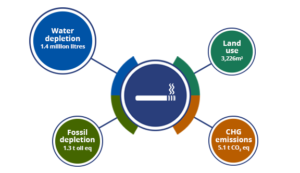Present data show that smoke from one cigarette produces ten times more air pollution than a diesel car’s exhaust.

Apart from individual health, consuming tobacco has horrendous impacts on our environment. Cigarettes cause pollution in multiple ways. The most prominent impact is air pollution. Present data show that smoke from one cigarette produces ten times more air pollution than a diesel car’s exhaust.
More astounding, these particulate materials emitted from smoking degrade the immediate environment and remain for hours in the air. In the manufacturing and processing of cigarettes, billions of trees are cut down every year.
Considering statistics by Imperial College London, the 32.4 million tonnes (Mt) of green tobacco harvested in 2014, used for the production of 6.48 Mt of dry tobacco in the six trillion cigarettes manufactured worldwide in 2014, contributed almost 84 Mt of CO2 emissions to climate change—approximately 0.2% of the global total.
Also, China alone harvests over three million tons (Mt) of leaves and trees for the tobacco industry. Another burden on the air is burning coal and other fossil fuels to produce cigarettes and tobacco for commercial use.
The impacts of tobacco put tremendous pressure on the air quality index and are one of the main reasons why developing countries are unable to improve their air quality. Can one imagine a desire for one cigarette that costs a lot for the environment? A sane mind must discourage the temptation of smoking and the production of useless products not just for our own sake but for our planet Earth.

Tobacco and land degradation
In addition to it, cigarette waste contributes a lot to land pollution due to its non-biodegradable nature.
Cigarette butts never disappear and lead to land degradation by being carried as runoff and drains to rivers, beaches, and oceans. They have long been the single most collected item on the world’s beaches, with a total of more than 60 million collected over 32 years.
To curb land and soil pollution, environmentalists and world leaders can ban the use of plastic, just as they have turned a blind eye to cigarettes.
Consuming tobacco and water scarcity
Along with this, tobacco is also a big source of water scarcity. One report calculates the environmental impact of a single smoker over their lifetime: a person smoking a pack of 20 cigarettes per day for 50 years is responsible for 1.4 million litres of water depletion. In industries, tobacco production uses more than 22 billion tonnes of water.
In the wake of these figures, tobacco and the consumption of cigarettes have devastating impacts on the environment, particularly for developing nations such as Pakistan. Before it gets too late, developed and developing nations must limit the use of tobacco for the sake of our environment and ecosystem, as every step would be beneficial.
The world should learn from the act of New Zealand, whose parliament recently passed a bill that will completely make tobacco illegal for those who are born after 2009. This gesture of restricting smoking will bear fruit for coming generations and our environment.
The world has to make a choice: either to benefit the tobacco industries by not banning tobacco or to restrict tobacco by safeguarding lives and our planet. The options lie between short-term gain with prolonged devastation and long-term sustainability with short-term pain.
Pakistan also needs to increase the levy on tobacco and limit the use of cigarettes, as the country is already the eighth most vulnerable in the environment.
